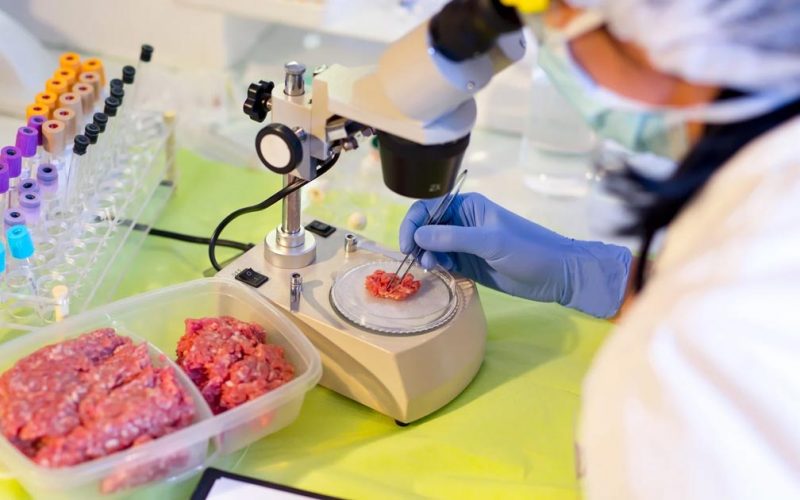An emergency alert has been issued after experts discovered that the U.S. food supply has been spiked with infertility drugs.
80 percent of Americans tested so far have been impacted by the issue.
People have been testing positive for traces of a chemical that is typically used in farming to sterilize livestock.
The alarm was raised after members of the public were found to have traces of the drugs in their urine.
A new study published today in the Journal of Exposure Science & Environmental Epidemiology reported that the majority of a set of nearly 100 urine samples collected from people in different states over the last few years showed the presence of a pesticide called chlormequat, which is used in agriculture.
Notably, the study found that both frequency of detection and concentrations of the chemical were starkly higher in 2023 than in samples collected from prior years.
“While the sample size is small and more research will be needed to verify the extent of the problem, it is very concerning to see chlormequat chloride showing up in these samples, and at increasing levels,” said Danielle Melgar, a specialist in food and agriculture advocacy work with the Public Interest Research Group.
“It means that consumers are clearly being exposed to it,” Melgar said.
“If it wasn’t linked to health concerns, that might not be an issue, but independent research has established connections to fetal and reproductive health harms in animal studies.”
Chlormequat is used to regulate the size of plants by blocking certain hormones.
Though primarily used on ornamental plants in the U.S., it is allowed on imported foods from other countries, including Canada and Europe where chlormequat is approved for use on wheat, oats, and barley.
Last year, the U.S. Environmental Protection Agency (EPA) proposed that farmers in this country also be allowed to apply it to their food crops. By regulating the growth of crops such as wheat, yields can be improved, farmers have found.
But animal studies show chlormequat exposure can disrupt embryonic growth and contribute to other health problems.
Environmental and health advocates cite those studies in strongly opposing any expansion of use. Last year, PIRG sent a petition to the EPA, arguing that “a slightly bigger harvest isn’t worth the risk to our health.”
Concentrations climb
The authors of the study include three researchers from the Environmental Working Group (EWG), along with a biomedical researcher at the Medical University of South Carolina.
The research team analyzed 96 urine samples collected by laboratories in Missouri, Florida, and South Carolina over a time period ranging from 2017 to 2023.
Approximately 69% of the 2017 samples showed the presence of chlormequat, climbing to 74% for the 2018-2022 period and hitting 90% for the 2023 samples.
The concentrations also were “significantly higher” in 2023 samples than in samples from the prior years, the study found.
Separately, the research team also looked at the frequency of detection of chlormequat in oat and wheat-based products purchased in U.S. stores in 2022 and 2023. They found chlormequat in 23 of 25 conventionally grown oat products and one of the eight organic oat products sampled.
The researchers also reported finding low concentrations of chlormequat in two of nine wheat-based products.
The new research adds to a smaller sampling of products that last year led EWG to report finding chlormequat in all but one of 13 non-organic oat-based cereals, granola, and other product tests conducted by an independent laboratory.
Because pesticides such as chlormequat are generally flushed from the body fairly rapidly, finding such a high prevalence indicates routine and continuous exposure.
“Additionally, trends in these data suggest that exposure levels have increased and might continue to increase in the future,” the study states.
‘Widespread exposure’
The study notes that recent reproductive toxicity studies in rats have shown reduced sperm motility and decreased weights of male reproductive organs among other issues.
Given the results of the animal studies and the “widespread exposure” of people to chlormequat, monitoring and more studies on chlormequat impacts are “urgently needed to understand the potential health harms … particularly during pregnancy,” the study concludes.
The EPA only started formally allowing chlormequat on food products entering the U.S. a few years ago, and in 2020 raised the level of residues of the chemical considered permissible on food.
“This is a really unique opportunity where we’ve identified this emerging chemical that really was only introduced into the U.S. food supply within the last five years,” said EWG toxicologist Alexis Temkin, who is one of the authors of the study.
“So we have this ability to be at the forefront of tracking what human exposure looks like.”
Given the health problems associated with chlormequat in animal studies, there is a real risk of potential human health effects that the EPA is not accounting for, according to Temkin.
“It’s something we think is worth studying a lot more,” she said.


It’s genocide in slo-mo ….
With the deadly vaccines, the infertility drugs, the never-ending unwinnable wars. The upcoming food shortages will be a biggie when it’s in full bloom. Starvation worked well for Stalin.
“Just discovered” my foot! Who do you think had farmers adding it to our food???
“…yields can be improved…” but fewer people will be around who’ll require food as they continue to try to eliminate us. This globalist crowd is pretty stupid, no? Or perhaps they think we are – just throw shyt out and see if it sticks… Ignorance dressed as genius is always boring.